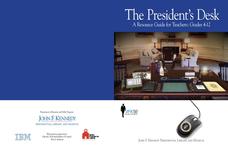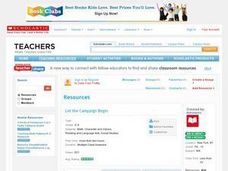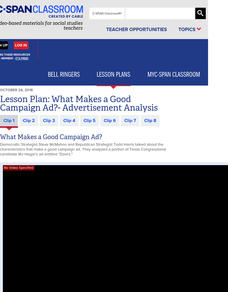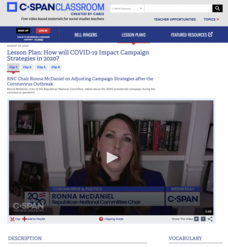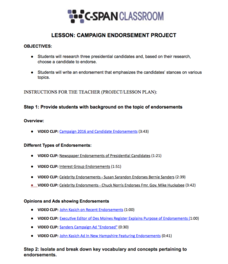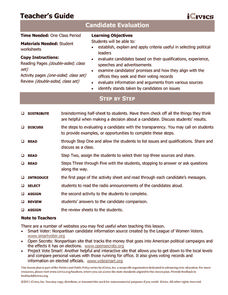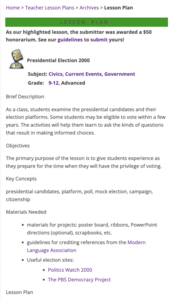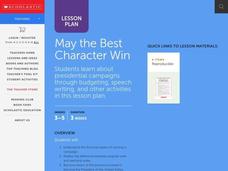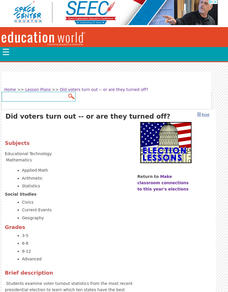Carolina K-12
How Do I Pre-Register and Vote in North Carolina?
Did you know that in some states your pupils can pre-register to vote? Teach the advantages to pre-registering and engage the classroom in an intriguing discussion about youth voting trends. Class members participates in a live polling...
iCivics
Step Nine: Action Campaign
It's time to take action! Learners strategize their action campaigns by using the resource and past brainstorming activities from the series that help them pinpoint problems in their communities. They use included templates to get the...
Staples Foundation For Learning
The President’s Desk
What stories can a desk paperweight and picture frame possibly tell us about the president of the United States? Pupils are transported to the desk of President John F. Kennedy through an engaging interactive site. The guide offers...
iCivics
Mock Election
Here is an excellent resource in which class members host a mock election for a candidate and policy that will be implemented into your very own classroom. Progressing from primaries, through the campaign trail, and finally to the mock...
Curated OER
Let the Campaign Begin
Students examine the many steps involved in the electoral process. They examine past president's campaigns and write an announcement speech for the candidate of their choice.
Curated OER
May The Best Character Win
Students examine the financial committment to running a campaign. They discuss the difference between electroal and popular votes. They realize how involved a political campaign is!
iCivics
Campaign Cash: Money Talks!
Money talks! And it can reveal a lot about political candidates. An 11-slide presentation examines how candidates raise and spend money on an election. The slides, using data from the 2016 Presidential election, reveal how much it costs...
C-SPAN
What Makes a Good Campaign Ad?- Advertisement Analysis
In the time of a hotly contested presidential election, campaign ads are almost ubiquitous—but what makes them good? Using ads from the 2018 midterm elections, learners consider the various strategies candidates use to get the vote....
C-SPAN
How will COVID-19 Impact Campaign Strategies in 2020?
While COVID-19 has changed almost everything about daily life, it's also had a tremendous impact on the 2020 presidential contest. Using video clips featuring political advisors from both sides of the aisle, learners brainstorm what they...
Encyclopedia Britannica
Get out the Vote Campaign
While some of your students may be too young to vote, they can get involved in the election process by creating a nonpartisan campaign encouraging voter registration. After researching how to register to vote, class members design PSAs,...
Encyclopedia Britannica
Campaign Photo Analysis
It's the art of the image! As part of a study of the 2020 Presidential race, groups analyze an image of a candidate, first from an objective point of view and then subjectively. They then prepare a presentation detailing what they...
Constitutional Rights Foundation
Elections, Money, and the First Amendment
Those who spend the most, win. Academics read informational text, participate in group discussion, and defend campaign reforms to understand the correlation between money, the First Amendment, and election results. The resource...
C-SPAN
Campaign Endorsement Project
So many politicians, so many endorsements! Learn to differentiate between facts as well as the process of endorsements with an informative resource. Class members watch current endorsement videos, research candidates from three different...
C-SPAN
Student Symposium and Resulting Action
Your class may not be able to vote yet, but that doesn't mean they can't feel like they're part of the presidential election! The resource creates a symposium where pupils debate about a selected topic in current events during an...
Constitutional Rights Foundation
Options for Affecting Public Policy
Letter-writing, e-mail and telephone campaigns, petitions, marches, meetings, with lawmakers. Options for influencing elected representatives are the focus of resource that details how to craft each of these approaches to influencing...
Museum of the Moving Image
What Makes an Effective Ad?
As an introduction to a series of related resources that examine political advertising and commercials from 1952-2012, class members use the provided rubric to analyze and rate the effectiveness of the emotion, persuasion, factual...
Curated OER
Individuality vs. Conformity
Spark an animated debate in your class! Young adults consider some of the fads or trends that are prevalent at their school, as well as their own level of participation in them. Just how much of a role does popular culture play in their...
iCivics
Win the White House
Here is a unique and engaging approach to learning about the steps a presidential candidate must take during a campaign. Learners role play the part of a candidate in this online interactive, taking part in a presidential...
iCivics
Candidate Evaluation
How can we decide between candidates on election day? After contemplating various issues and qualities, your learners will go through a step-by-step process of researching and evaluating sample candidates and determining their...
Curated OER
Campaign Ad Critique
Students analyze current campaign TV ads and literature. They identify the ad by "type." They learn to look beyond the ad to understand its intended purposes and its real content.
Curated OER
Presidential Election 2000
Students examine the presidential candidates and their election platforms. They further analyze the platforms by creating a chart to determine which candidate most represents his or her beliefs and values.
Curated OER
The Election Is in the House: 1824: The Candidates and the Issues
Students list some changes in presidential election laws and/or procedures since 1796, and cite examples from presidential campaign materials from 1824.
Curated OER
May the Best Character Win
Running an election campaign takes money. Class groups must effectively budget money in order to design and purchase sufficient advertising aimed at procuring classmates' votes. After completing an online tutorial, they also write and...
Curated OER
Did Voters Turn Out -- or Are They Turned Off?
What was the voter turnout at your last state election? Examine voter turnout statistics from the most recent election to learn which ten states have the best turnout record. This lesson offers election data, handouts, and worksheets.




